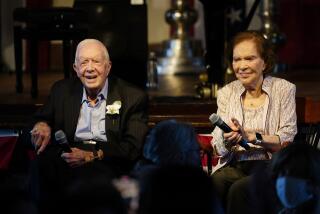Rehabilitation for Medicare : Elderly Are Devastated by Lack of Aid After Hospitalization
- Share via
The American medical system, fueled by an amazing array of technological advances, has become the finest in the world. We transplant hearts, kidneys and other organs, and we use sophisticated diagnostic tools that were undreamed of a few decades ago. As a society, we should be proud of the miracles of modern medicine. We have become very proficient at saving and extending life.
For the elderly and many of the disabled, access to this high-tech health care is made possible through Medicare, which pays hospital and physician bills on their behalf.
Twenty years ago, before Medicare’s enactment, more than half of the elderly were without health insurance. When illness struck, they were faced with the choice of paying substantial bills on their limited incomes, seeking charity care, or going without treatment. The statistics from those days tell us that many simply had to choose the last option; some died an early death as a result.
Medicare has clearly made a difference, no doubt contributing to the impressive gains in improving the health and extending the length of life of the elderly over the last two decades. Gone is the fear that the hospital won’t admit an elderly patient because he or she cannot pay. Gone is the fear that needed surgery will exhaust a lifetime of savings. With Medicare, the elderly now use physician care and hospital services at the rate expected for their age and health status.
Yet Medicare’s record of accomplishments presents an incomplete picture. Something is missing. Something is wrong.
While Medicare pays for the sophistication and technology of modern medicine--sterile hospital rooms with fancy monitoring equipment, expensive intensive care services, renal dialysis, nuclear magnetic resonance, angiography and angioplasty and open-heart surgery--it does not pick up the cost of preventive care or help at home. It does not pay for prescription drugs, dental care, eyeglasses or hearing aids. It offers no protection for those who need long-term nursing home care and little protection for those with prolonged or disabling disease.
Families are expected to bear the burden of caring for their frail loved ones. For the many elderly who live alone, there is no one to turn to in times of need. Illness can still crush and destroy the savings of a lifetime because Medicare covers less than half the health expenses of the elderly.
In other words, while we’re willing to pay to repair broken and diseased bodies, we aren’t willing to provide care for people or give them the services that will improve their ability to live a full life after they have left the hospital. In the midst of the increasing sophistication of our medical services, many of our elderly spend their last days in nursing homes or struggling to cope at home. Too many are left to die with inadequate care.
This is not a new problem; our public health programs have never been designed to cover long-term care. Unfortunately, the problem may be getting worse. In 1983 Medicare’s method of reimbursement to hospitals was changed to a prospective system with fixed payment based on a patient’s diagnosis. The new system gives hospitals a strong incentive to discharge Medicare patients as soon as possible. Evidence indicates that some hospitals are responding too well.
We are beginning to get more and more reports of Medicare beneficiaries being prematurely discharged from hospitals. And we are beginning to get troubling reports that some of the elderly are being sent home earlier, and sicker, to frail spouses or friends who are unable to meet their needs.
While it may be good policy to move the elderly out of hospitals quicker, it is bad policy if they receive inadequate care once they have been discharged. Improved home care and nursing home services should be essential adjuncts to Medicare’s coverage.
For too many, finding and financing needed care has become a track to nowhere. It is time to re-evaluate what the elderly need to assist them in living full and productive lives. Medical miracles are only part of the picture.
The challenge of the future is to provide true financial protection from the devastation of illness for all older Americans. We need to expand the availability of care to those who need assistance once they are no longer hospitalized. We must protect the current Medicare program from Reagan Administration budget cuts and we must work to expand its protection. We need to put Medicare back on track.






